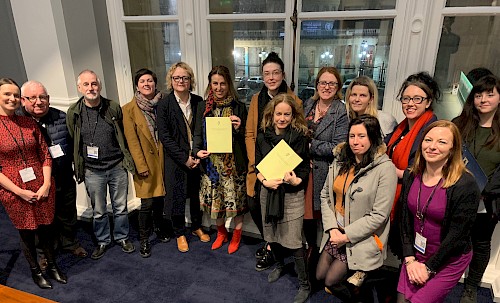Ebulletin #101
9th April 2019
IPRT Ebulletin
- Appointment of new IPRT Executive Director
- IPRT 'Care and Justice' Report Launch
- Criminal Justice (Rehabilitative Periods) Bill 2018 [PMB]
- Publication of the 2017 Prison Visiting Committee Annual Reports
- Add your voice - become a Friend or Member
See the Mailchimp version here.
Subscribe to IPRT news here.
____________________________________________________
Appointment of new IPRT Executive Director
Dear members and friends,
 I am delighted to inform you that, following a recruitment process, the Board of Directors have given me the privilege and responsibility of leading the Irish Penal Reform Trust (IPRT) as our new Executive Director.
I am delighted to inform you that, following a recruitment process, the Board of Directors have given me the privilege and responsibility of leading the Irish Penal Reform Trust (IPRT) as our new Executive Director.
You can read our Chairperson Dr Seamus Taylor’s announcement here.
It is a huge honour to be chosen to lead IPRT, particularly as we approach our 25th anniversary later this year. My predecessors have built a vibrant organisation with a distinct and essential purpose, guided by our clear conviction that a just and humane penal system will help create fairer and safer communities.
Our recent report on children in care who come in contact with the criminal justice system and our ongoing campaign to deepen reform of spent convictions legislation underline our mission’s urgency and importance.
I am also mindful, having been part of IPRT since 2009, of the road ahead. We have achieved real reforms but much remains to be done. I look forward to building on IPRT’s track record with my skilled and dedicated colleagues in IPRT, supported by our expert Board and our Members and Friends.
Thank you again for your ongoing support of IPRT and penal reform in Ireland. I look forward to keeping you updated on our projects and progress in the coming year.
Kind regards,
Fíona Ní Chinnéide
Executive Director, Irish Penal Reform Trust
____________________________________________________
IPRT ‘Care and Justice’ Report Launch
There are currently over 6,000 children in care in Ireland. While the vast majority of these children will have no contact with the criminal justice system, the small number who do are likely to have experienced multiple adversities and challenges in their lives. These adversities can include: family breakdown, being taken into care itself, having to move accommodation and schools a lot, and separation from their communities. Certain factors may lead to some young people from care coming into contact with the criminal justice system, including the type and quality of care provision, and how the criminal justice system responds to these young people.
 To highlight our concerns, IPRT launched an independently commissioned exploratory research study on the connections between care and justice in Ireland Care and Justice: Children and Young People in Care and Contact with the Criminal Justice System on Tuesday 26th February 2019. The research was carried out by Dr Nicola Carr (University of Nottingham) and Dr Paula Mayock (Trinity College Dublin). The report was launched by Ombudsman for Children, Dr Niall Muldoon (pictured right).
To highlight our concerns, IPRT launched an independently commissioned exploratory research study on the connections between care and justice in Ireland Care and Justice: Children and Young People in Care and Contact with the Criminal Justice System on Tuesday 26th February 2019. The research was carried out by Dr Nicola Carr (University of Nottingham) and Dr Paula Mayock (Trinity College Dublin). The report was launched by Ombudsman for Children, Dr Niall Muldoon (pictured right).
The need for reform is outlined in 12 recommendations made in the report. These include:
- A joint protocol aimed at addressing the involvement of children in care with the criminal justice system should be developed by the Department of Children and Youth Affairs and the Irish Youth Justice Service with the involvement of An Garda Síochána and Tusla.
- The Irish Youth Justice Service should consider adaptations to the Bail Supervision Scheme to ensure equity of service provision for young people in care.
- Tusla should develop a mechanism to systematically record and report on the numbers of children in care and those in receipt of aftercare services coming into contact with the criminal justice system.
- In its review of the Youth Justice Action Plan, the Irish Youth Justice Service should consider the specific needs of care-experienced young people.
- Tusla should revise its guidance on Complex Needs in Aftercare to provide explicit guidance on the needs and supports required for young people in contact with the criminal justice system.
To read the report in full, click here.
To read a summary of the recommendations, click here.
The research was supported by a Private Donor Fund at the Community Foundation for Ireland.

____________________________________________________
Criminal Justice (Rehabilitative Periods) Bill 2018 [PMB]

Senator Lynn Ruane and Senator Alice-Mary Higgins with the IPRT team and other champions of the need for improved spent convictions legislation, Seanad Éireann, 13 February 2019.
The Criminal Justice (Rehabilitative Periods) Bill 2018 was introduced in the Seanad on 20 December 2018 by Senator Lynn Ruane, and returned at second stage debate on 13 February 2019. The Bil seeks to increase the number of people who can benefit from spent convictions legislation by: broadening the range of convictions which may become spent; providing for proportionality in deciding when a conviction can become spent; and taking account of the special position of 18-23 year olds.
The long-lasting impact of a criminal record on people’s access to housing, work, volunteering, education, and insurance was illustrated by the findings of an online surveyconducted by IPRT in January 2019. In total, 148 people with convictions histories completed the survey.
Limitations in the scope of the Criminal Justice (Spent Convictions and Certain Disclosures) Act 2016 means it does not fulfil its rehabilitative purpose, and is of no benefit to people who were convicted of more than one offence (other than minor motoring/public order offences), even where the offences were minor and committed decades ago.
IPRT strongly welcomes the Criminal Justice (Rehabilitative Periods) Bill 2018 as an opportunity to improve the situation for people with old convictions who want to move on with their lives.
Read the IPRT Briefing on Criminal Justice (Rehabilitative Periods) Bill 2018 [PMB] here.
The Criminal Justice (Rehabilitative Periods) Bill 2018 [PMB] introduced by Senator Lynn Ruane is available to read here and a copy of its explanatory memorandum is available here.
For more information on IPRT’s campaign, see: www.iprt.ie/spent-convictions
____________________________________________________
Publication of the 2017 Prison Visiting Committee Annual Reports
The Department of Justice and Equality published the 2017 Annual Reports from the Visiting Committees for each of Ireland’s prisons on 8th March 2019. IPRT remains concerned about the delays in publication of the Visiting Committee Annual Reports. and the impact this has on facilitating timely responses to the issues raised. IPRT also remains concerned that in order for the Prison Visiting Committee system to effectively contribute to a broader framework for inspections and monitoring in Irish prisons, the Department of Justice and Equality must take action to reform and strengthen the current Prison Visiting Committee system.
Concerns about persistent staffing shortages were identified in many of the prison reports and the knock-on effect this has had on prisoners’ access to education, training and necessary healthcare were raised by Visiting Committees reporting on prisons across the estate.
IPRT is particularly concerned about the situation in the Dóchas Centre, where it has been reported that “serious challenges” have arisen due to “over-stretched” resources. The Annual Report of the Visiting Committee for the Dóchas Centre also expressed serious concern at the accommodation of mothers and babies on a general corridor of the prison.
Overcrowding is an issue highlighted across several of the Visiting Committee reports. It is reported that the rise of prisoner numbers has led to ‘doubling up’ in bunks, with some prisoners sleeping on floors. IPRT restates that it is impossible to have any meaningful interventions or to tackle offending behaviour in an overcrowded prison environment.
For more information on IPRT’s response to the 2017 Annual Reports of the Prison Visiting Committees, see: http://www.iprt.ie/contents/3415 and http://www.iprt.ie/contents/3416
___________________________________________________
Add your voice – become a Friend or Member
IPRT relies on a network of committed supporters who share our vision for change. By becoming a Friend or Member of IPRT, you add your voice to our campaign for a more humane and equitable penal system.
To find out more about supporting our work, please visit our Friends or Membership pages.
IPRT relies on donations from charitable trusts, individual donations and membership subscriptions to cover operational costs. Our CHY number is 11091.
We have also received funding from two donor-advised funds and two project funds managed by the Community Foundation for Ireland, we were one of the awardees for the inaugural Human Rights and Equality Grants Scheme of the Irish Human Rights and Equality Commission, and we received a donation from the St. Patrick’s Cathedral Community Giving & Charitable Funds in 2017 and 2018.

The Scheme to Support National Organisations is funded by the Government of Ireland through the Department of Rural and Community Development.




